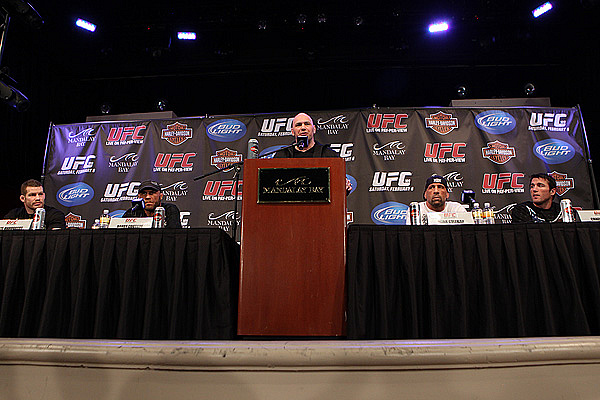Viewpoint: Speaking in Code

Anheuser-Busch last week issued a stern warning to the Ultimate Fighting Championship. The gist of the message: shape up or else.
“We’ve communicated to the UFC our displeasure with certain remarks made by some of its fighters, and they have promised to address this. If the incidents continue, we will act,” the company told Advertising Age. “[Anheuser-Busch] embraces diversity and does not condone insensitive and derogatory comments rooted in ethnicity, race, religion, sexual orientation, gender identity, disability, etc.”
Advertisement
Evans told Phil Davis “I’m going to put my hands on you worse than that dude did them other kids at Penn State” on Dec. 7, and Torres issued his infamous “rape van” Tweet around that same time. Meanwhile, Griffin declared that “Rape is the new missionary” on Twitter in November.
As it turns out, Anheuser-Busch, which makes Bud Light and Bud
Light Lime, might have been responding to recent concerns over a
letter issued by Alcohol Justice to company shareholders on April
18. In the letter, Alcohol Justice Executive Director and CEO Bruce
Lee Livingston urges shareholders to oppose Anheuser-Busch’s
sponsorship of the UFC.
“We believe [Anheuser-Busch’s] sponsorship of UFC must come to an end as there is a very tangible risk to the bottom line of dividends and stock price value as well as long term bad press as the relationship of this patently brutal blood sport to predatory marketing of Bud Light to underage youth are played out on the global stage of public opinion,” Livingston wrote. “It’s already being called ‘Blood Light.’ This cannot be good for business, sales, or long-term profitability.”
Alcohol Justice refers to itself as “The Industry Watchdog” on its website and states that it “envisions healthy communities free of the alcohol industry’s negative impact.” It also takes an antiquated view toward mixed martial arts. In a YouTube video created by the organization to campaign against the UFC-Anheuser Busch partnership, the sport is linked to cockfighting and dogfighting -- a tired comparison that MMA fans know all too well.
Even though we are far removed from the UFC’s formative years, when the terms “no holds barred” and “Ultimate Fighting” were nearly synonymous, there are still plenty of detractors out there who view the sport -- as stated in the video -- as nothing more than “humans beating each other’s brains to a bloody pulp over the Bud Light logo.”
Say what you will about the marriage of alcohol and athletics, but having such a major logo in the center of the Octagon was a big-time coup for the UFC. Nostalgic fans will recall the days when Mickey’s beer had its logo prominently displayed at major events. With mainstream sponsorship comes mainstream scrutiny, and the UFC will have to adjust accordingly.
There is less margin for error for MMA than for other sports. It is worth noting that Alcohol Justice did not target the NFL or professional boxing -- both of which have plenty of violent tendencies and questionable characters -- in its campaign. Fighters competing within the confines of a cage somehow always tend to elicit a more visceral reaction.
The poorly conceived remarks of a few should not represent the entire roster, but when big money is involved, that is exactly what tends to happen. The oft-discussed-but-not-yet-implemented code of conduct could help remedy this problem. Not only would it allow the UFC to give its athletes established parameters for what is acceptable and what is not, it simply looks better for the promotion to have its official policy in writing. That way, when the next big-time sponsor comes calling, there will be no question as to what the UFC expects of its employees.
“With over 425 athletes on our roster, there have unfortunately been instances where a couple athletes have made insensitive or inappropriate comments,” the promotion stated last week. “We don’t condone this behavior, and in no way is it reflective of the company or its values.
“As an organization, we are progressive in social media and, unlike most other sports leagues, we encourage our athletes to engage online,” the statement continued. “It is part of our company culture, and whenever you are at the forefront of a trend or initiative, it comes with its own pitfalls. We will continue to embrace social media while looking for better ways to stay in front of the issues. This includes a mandate for our athletes to attend sensitivity training and a seminar on proper use of social media.”
Obviously, much of what the UFC has done is working: the organization has bigger sponsors and better television contracts than ever before. However, there will always be those who are reticent to attach their brand and money to such a violent product; that is just a fact of life.
If the UFC is to maintain its current relationships with advertisers, as well as encourage new ones, more clarity in regards to athlete conduct is imperative.
Related Articles






